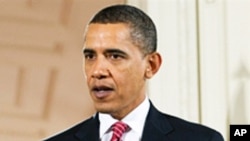As U.S. President Barack Obama prepares to announce his new Afghan strategy, members of Congress are offering last-minute advice. Mr. Obama will spell out his plan Tuesday in a speech to the nation from the U.S. Military Academy at West Point, as lawmakers get back to work after a holiday recess.
Congressional support will be crucial to President Obama's plan, since lawmakers must approve the funding.
Carl Levin, the Michigan Democrat who heads the Senate Armed Services committee, says the president's focus must be on bolstering the Afghan army. "The key here is an Afghan surge. Not an American surge," he said.
Levin told the CBS program Face the Nation that President Obama must detail a strategy that will ultimately enable the Afghans to protect themselves. "If the mission is to give them the capacity to take on the Taliban - and I believe that will be the principle mission statement - that would be one important thing to happen for Democratic support," he said.
Afghanistan is one area where the president may be able to count on Republican support.
Members of the opposition party in Congress have been calling for an increase in troop levels in Afghanistan. Among them is Senator Lindsey Graham of South Carolina, a member of the Armed Services committee. "This is not just any place on the planet. This is the place where the Taliban took control after the Russians left, aligned themselves with al-Qaida and attacked this nation and killed 3000 Americans," he said.
The big dilemma for supporters of an increase in troop strength - at a reported cost of $1 million per soldier per year - is how to pay for it.
Graham told ABC's This Week, the war must be a spending priority, and cuts should be made in other programs. "Where does our national security rate in terms of spending? Are there things that we can do in the stimulus package? Can we trim up the health care bill and other big ticket items to pay for a war that we can't afford to lose?"
One idea that is being floated on Capitol Hill is a special war tax. Senator Evan Bayh - an Indiana Democrat - says that is the wrong way to go. "If, ultimately, you are going to have to start talking about raising taxes, you shouldn't do it until the economy is robust and really on some pretty good footing," he said.
During an appearance on the Fox News Sunday program, Bayh said the president has to address cost concerns in his speech.
But he said he will be listening to hear what Mr. Obama plans to do to put pressure on the Afghans and the Pakistanis to meet their obligations. "It is a fine balance. We have to got to show we have the determination to see this through on the one hand, but keep the pressure on them to do their part. And, by talking about an exit strategy under the right circumstances, I think you do that," he said.
Republican Senator John Kyl of Arizona told Fox News Sunday, any mention of an exit strategy will send the wrong signal to the region. "All of this talk about an exit strategy is really dangerous. It tells the Taliban just to lay low until we leave, and it does not encourage the Europeans, for example, or other NATO allies that this is a cause worth sending their troops to support," he said.
President Obama has spent about three months reviewing all his options in Afghanistan, spending long hours in detailed closed-door discussions with his national security team. He is expected to announce Tuesday that he will send an extra 30,000 to 35,000 troops. But aides have also made clear he will talk about the long term, and his plans to see to it that the Afghans are ultimately able to take care of their own security needs so American forces can come home.
News
Obama Prepares for Afghan Speech, Senators Offer Advice
update

President plans speech for Tuesday at US Military Academy at West Point







